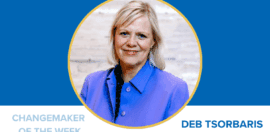Shifting gears for social equity

25 October 2024 at 9:00 am
Good Cycles is a social enterprise that uses bikes as a vehicle to create meaningful and lasting opportunities for people and communities in need. All Good Cycle revenue activities including the bike shop, servicing centre and bike share operations contribute to social programs that address some of the key issues that impact the lives of young people in Australia: unemployment, mental health and lack of regular exercise. Their CEO is Jaison Hoernel, with influential roles across the industry, Jaison’s depth of expertise is highly regarded.
He has enjoyed success in establishing one f Australia’s most successful and highly regarded commuter and specialty bicycle retail shops, holds an MBA (Executive) from RMIT and has a highly developed financial acumen. Jaison has held management positions in both Australia and Asia and been actively involved in developing sponsorship and funding models for public transport projects internationally
Describe your career trajectory and how you got to your current position.
I have had a career that’s been largely based on my own businesses and all sorts of commercial opportunities. I found I was good at making money (my wife would say I’m very good at making money for other people!) I’ve found a lot of interest in creating what I realised was value. Somewhere along the line I realised that it was the people that mattered more to me, and I enjoyed giving people the opportunity to grow and do things. So, 9 years ago I wanted to go into the nonprofit space and that was what led me to Good Cycles. I came in when the founders had gotten the organisation up after a couple of years and had the idea of connecting bikes to young people. I came in as a general manager initially and now my role is CEO.
What does this role mean to you?
I’ve always found myself in places where I thought I had control enough to make things happen and, early on, a big part of it was based on creating the change that matters to me. Over time, that’s changed to how do I bring and support others on that journey? How can I lead an organisation, give people the opportunity to create their own journeys, and be a blunt instrument for change where I need to be? What really resonates with me about this type of role now is creating space for other people around you and to hold that space is the biggest thing.
Take us through a typical day of work for you.
I’m an early person so my day probably starts at 6 o’clock and I’ll get on my phone (which I know is terrible!) and check to see what my day entails. I’m probably happiest when I’m out and about doing things. I think my strengths are about networking and meeting people so largely my day has a lot of meetings, a lot of talking. Sometimes I think my own kids don’t understand what I do. They say “what does Dad do? Oh, Dad just talks to people!” but I think that’s the biggest part of it. It’s about communicating to people, and I’m always being as optimistic as I can be.
What is the biggest challenge you’ve encountered in your career, and how did you overcome it?
One of the first business I bought was a bike shop in the middle of winter. I’d taken equity out on our house to buy the business and in the first week of trading I sold about $200 and on the Saturday night, someone smashed the front of the window with a brick and stole a bike. I had 2 small kids at the time, so I was wondering what have I done? That was probably one of the most challenging things for me to get through. That first 6 months of owning your own business and thinking you have to be there all the time and it’s all up to you, then realising you can’t do and you have to accept that there are things that are out of your control. You have to figure that out because otherwise it will kill you. I think there’s been a few times in my life where I’ve had that experience understanding there’s only so much control you can have. The biggest challenge is recognising that the best thing for you and the people around you is to let a bit of that control go. Even if it means that there are compromises to that, even if it means taking a step back. Sometimes it’s important.
If you could go back in time, what piece of advice would you give yourself as you first embarked on your career?
I think to be kinder on myself, absolutely, and to be patient. I didn’t learn patience until my forties, and I still question whether I’m patient enough!
How do you stay motivated to work in this field?
That’s a really good question because I think the biggest thing is acknowledging just how mentally and emotionally exhausting it is. It’s really easy to get frustrated along the way, particularly when you’re trying to make a difference.
I always say ‘There’s no point standing in front of the bus to stop it, we need to figure out how to buy the bus so that we can do something better with it’. That takes a lot of energy and sometimes you have to give yourself permission to fail as it’s important you look after yourself first because it’s emotionally really challenging. Everybody takes it very seriously and it is serious. Most people who are working in this sector are here because it means something to them. That adds a higher level of expectation to what you have to do so it means we drive ourselves harder. We ask more of ourselves unconditionally. So sometimes you just have to give yourself permission to say, it’s okay. The world’s gonna keep going and you can only change what you can.
How do you unwind after work?
I’m fortunate to live close to the beach, so I go for beach walks which I love. I watch my kids play sport. I used to ride my bike a lot and I listen to music sometimes, but not as much as I should.
What was the last thing you watched, read, & listened to?
Last night I watched the movie Armageddon. It’s a cliche and so bad but also so great! I grew up with Paul Simon and I still listen to Paul Simon as my go to. I’m reading a book called ‘Range: Why Generalists Triumph in a Specialized World’ which is really interesting. I’m finding it quite fascinating.







